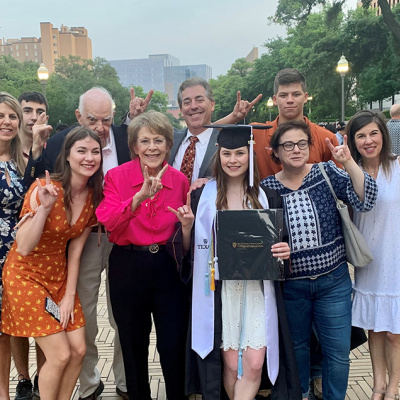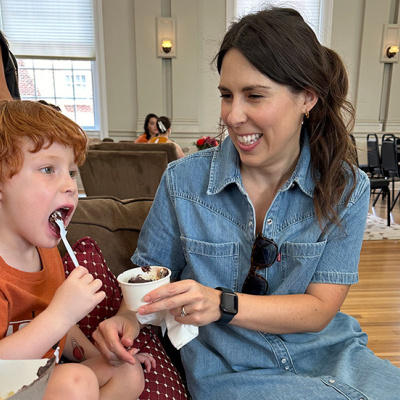Obama Honors LBJ in Civil Rights Summit Keynote

As the audience at the LBJ Library eagerly awaited President Obama's arrival Thursday morning, so did a crowd of a few hundred students, faculty, and staff in front of the UT Tower. Some sipped free lemonade as they staked out spots in front of the big screen to watch the president's keynote address at the Civil Rights Summit. The three-day summit, the first of its kind, was inspired by the 50th anniversary of the 1964 Civil Rights Act, and Obama's speech drew heavily from Johnson's life and achievements—including some of his most memorable quotes.
The tribute began with footage of a speech from Lyndon B. Johnson, transitioning into a montage of civil rights photos set to inspirational songs. Just as Johnson spoke of the bell of freedom ringing out, the Tower bells sounded at noon, emphasizing the historical event taking place on campus.
Grammy award-winning singer and civil rights activist Mavis Staples then took the stage with the civil rights movement anthem "We Shall Overcome," a powerful phrase reiterated throughout the event. LBJ Library director Mark Updegrove remarked that Martin Luther King Jr. teared up upon hearing LBJ speak those words. After giving a brief history of the civil rights movement, Updegrove introduced Rep. John Lewis, who gave an emotional account of segregation in American life. Lewis noted that without LBJ, presidents Carter, Clinton, and Obama—all of whom spoke at the Civil Rights Summit—would not be here today.

President Obama and First Lady Michelle Obama were welcomed to thundering applause from both the library auditorium and the group watching at the Tower. The crowd fell silent as Obama began his address, honoring LBJ's civil rights legislation, recalling his use of the presidential bully pulpit, and explaining how the 36th president's life and work in Texas informed his work on civil rights. Obama told the story of how LBJ was cautioned against becoming involved in the civil rights movement, to which Johnson replied, "What the hell is the presidency for?" other than to fight for causes you believe in.
Johnson didn't just stop at the Civil Rights Act in 1964, Obama stressed. He also pioneered the Voting Rights Act, Medicare, Head Start, and Americorps, among other landmark reforms collectively known as the Great Society.
He also addressed head-on the weariness that prevails in American political thought today. "I reject such cynicism because I have lived out the promise of LBJ's efforts," Obama said, "because Michelle has lived out the legacy of those efforts, because my daughters have lived out the legacy of those efforts, because I and millions of my generation were in a position to take the baton that he handed to us."
Obama urged that if young people can learn one thing from the Civil Rights Summit, it's that with effort, "those who love their country can change it."
Sheridan Schaefer, a senior psychology major, said she was excited to watch the livestream of the president's address in front of the Tower. She left feeling inspired by the speech about progress and change.
"It would have been amazing to see him speak in person, but the fact that we were all invited to watch it in the heart of campus was very meaningful," she said.
President Obama speaks at the LBJ Library. Photo by David Hume Kennedy, courtesy the LBJ Foundation.
Students gather to watch the President's speech on a live video feed outside the Tower. Photo by Jordan Schraeder.






